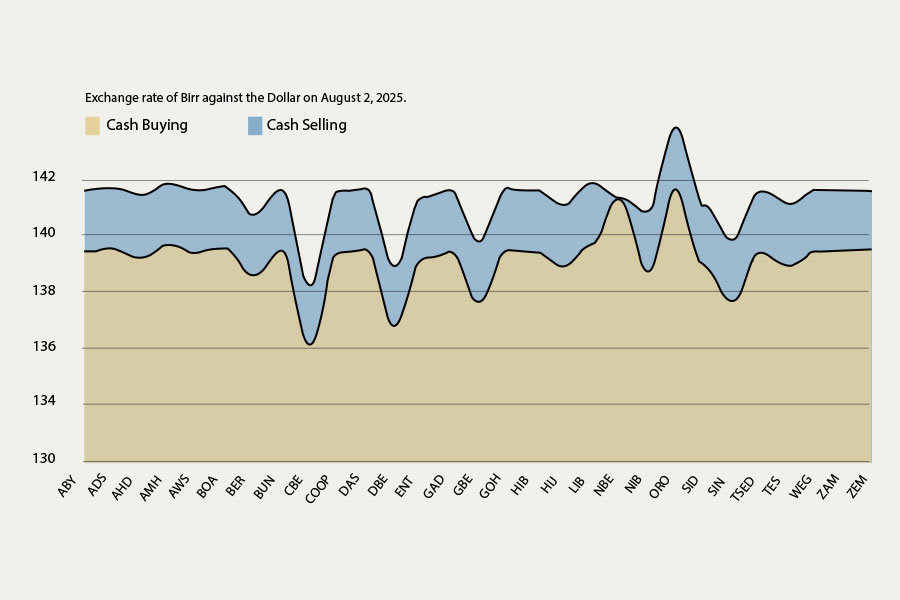
Fortune News | May 23,2021
The central bank has issued permission to private commercial banks to settle half of the shipping costs in foreign currency as accumulated freight payment receivables surpassed 150 million dollars.
Signed by Yinager Dessie (PhD), governor of the National Bank of Ethiopia (NBE), a letter sent to the Ethiopian Shipping & Logistics Services Enterprise (ESLSE) last week instructs the executives to receive part of freight payments in Birr.
Commercial banks owe the state-owned shipping enterprise close to 7.8 billion Br, unable to find the foreign currency to settle the receivables.
A rule enacted a decade ago required importers to pay for freights, through their banks, in foreign currency. Last week's directive changed this rule. Commercial banks are told to collect freight fees in Birr and transfer half the amount to the shipping company at the end of every month, in a foreign currency. The central bank's latest move applies to all imports, except for wheat, sugar, coal, and fertiliser, which the government mainly imports.
The move comes as banks struggle with forex mobilisation following the central bank's tightened retention rules. They must surrender 70pc of forex earnings from exports, remittances and transfers to non-governmental organisations (NGOs), beginning January this year. The balance is to be divided between the banks and exporters.
A year ago, banks used to enjoy access to 70pc of forex unused by exporters within 30 days of deposit.
The central bank adjusted the retention policy due to the urgent need to beef up the country's foreign currency reserves, which is inadequate to cover the ballooning import bills and external debt payments. Ethiopia's foreign exchange reserve has dwindled below two billion dollars to cover less than two-month imports.
Over the first half of the year, the federal government spent 2.1 billion dollars on importing essential goods and a further one billion dollars on servicing external debts. The deficit has been exacerbated by dwindling loans and grants from development partners.
Global supply chain disruptions stemming from the effects of the COVID-19 pandemic have only made things worse. They have prompted the Enterprise to quadruple freight charges over the past year. The cost of shipping a 40ft container from ports in China, Ethiopia's largest trading partner, has increased to nearly 13,000 dollars.
The Enterprise, too, is yet to pay 100 million dollars for rentals and other fees, disclosed Roba Megerssa, chief executive officer (CEO) of the ESLSE.
It operates a fleet of 11 vessels and leasing slots from other shippers such as Maersk and the Mediterranean Shipping Company (MSC). Banks and importers are expected to finance the country's sizable import bills partially and cover freight costs from the forex they are allowed to keep. The severe crunch in foreign currency is a headache to many importers, who are forced to compete to secure letters of credit (LC) and cover shipping costs.
The central bank's decision has provided slight relief to importers like Tilahun Chala, a major shareholder of Tilahun Chala Import & Export Plc. Incorporated 10 years ago with 20 million Br in capital, the company is engaged in exporting coffee, oilseeds and pulses. Like most exporters, it uses its forex earnings to pay for imported goods.
“Despite the export earnings, financing imports has been challenging,” said Tilahun.
A few months ago, the company spent 300,000 dollars to import 40 containers of vehicle tyres.
To Mengistu Wondwossen, director of resource mobilisation and branch banking at Wegagen Bank, the decision is a positive start to address the foreign currency crunch banks face.
"We expect further adjustments," he said.
Roba says the Enterprise is contemplating adjusting the schedule for the remaining payments expected from private banks.
Abdulmenan Mohammed, a financial statement analyst with two decades of experience, says that although the central bank's latest move does not change much to boost forex inflow, it will provide breathing room to banks and importers.
“In a forex shortage, it is essential to utilise the available resources to the fullest," he said.
PUBLISHED ON
Mar 26,2022 [ VOL
22 , NO
1143]

Fortune News | May 23,2021

Agenda | Oct 13,2024

Money Market Watch | Aug 17,2025

Radar | Nov 12,2022

Commentaries | Mar 25,2023

Radar | Dec 17,2022

News Analysis | Jan 19,2024

Fortune News | Jul 23,2022

Sponsored Contents | Jul 05,2021

Fortune News | Aug 07,2021

Dec 22 , 2024 . By TIZITA SHEWAFERAW
Charged with transforming colossal state-owned enterprises into modern and competitiv...

Aug 18 , 2024 . By AKSAH ITALO
Although predictable Yonas Zerihun's job in the ride-hailing service is not immune to...

Jul 28 , 2024 . By TIZITA SHEWAFERAW
Unhabitual, perhaps too many, Samuel Gebreyohannes, 38, used to occasionally enjoy a couple of beers at breakfast. However, he recently swit...

Jul 13 , 2024 . By AKSAH ITALO
Investors who rely on tractors, trucks, and field vehicles for commuting, transporting commodities, and f...

Oct 18 , 2025
The political establishment, notably the ruling party and its top brass, has become p...

Oct 11 , 2025
Ladislas Farago, a roving Associated Press (AP) correspondent, arrived in Ethiopia in...

Oct 4 , 2025
Eyob Tekalegn (PhD) had been in the Governor's chair for only weeks when, on Septembe...

Sep 27 , 2025
Four years into an experiment with “shock therapy” in education, the national moo...